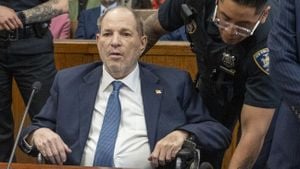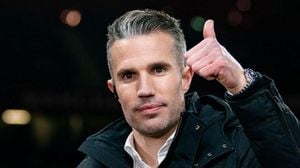Former Brazilian President Dilma Rousseff has been hospitalized after experiencing health complications, marking yet another chapter of difficulty for the seasoned politician. At 77 years old, Rousseff was admitted to Shangai East International Medical Center on Friday, February 21, 2025, due to high blood pressure, vomiting, and dizziness. This alarming health scare has raised eyebrows, particularly since it coincides with significant international engagements.
According to reports from the Folha de S.Paulo, the hospital confirmed Rousseff's condition and assured the public of her stability. "A ex-presidente Dilma Rousseff está internada em um hospital em Xangai, na China, após passar mal na última sexta-feira (21)," was communicated by the Shanghai East International Medical Center. Although Rousseff’s state is reportedly stable and showing continual improvement, she has unfortunately had to cancel attendance at the BRICS finance ministers' meeting and central bank governors' conference scheduled to take place in Cape Town, South Africa.
Rousseff is not only remembered for her presidency from 2011 until 2016, when she was impeached, but she has recently taken on the mantle of leadership at the New Development Bank (NDB) associated with BRICS nations. Having moved to China over one and half years ago to assume her role, she has rapidly become influential within this international financial institution. Since April 2023, Dilma has presided over the NDB, with her term initially set to finish in July 2025. The Brazilian government, through diplomatic negotiations with countries like Russia, has successfully extended her tenure for five more years, allowing her to report directly to President Vladimir Putin starting from July.
Her involvement with the NDB has positioned her at the helm during important discussions surrounding the economic strategies of BRICS nations. The cancellation of her participation at the upcoming conferences certainly raises questions about not only her health outcomes but also the potential shift of dynamics within the BRICS framework—especially with the presence of major economic challenges globally.
Rousseff’s significant political background frames her current situation uniquely, as many observers draw parallels between her health concerns and the stress faced by leaders today. Instances of political figures struggling with health have sparked discussions on the pressures of governance, especially when managing international alliances.
Despite this latest medical episode, officials from Rousseff's team have not confirmed detailed information about her health or any prospective discharge date from the hospital. With the world watching and many stakeholders invested in her role at the NDB, Rousseff’s recovery is awaited with great interest.
Her position commands attention not just because of her history but due to the economic developments her leadership could influence, particularly as BRICS entities aim to strengthen their economic foothold and international legitimacy. Rousseff's unexpected health challenges serve as a reminder of the vulnerability even seasoned politicians face and the ramifications of such occurrences on broader geopolitical engagement.
For now, Dilma Rousseff remains under medical care, and her future engagements will be closely monitored as the world hopes for her swift recovery. The impact of her absence from pivotal BRICS meetings could have varying responses, depending on her health and subsequent re-engagement once she is cleared for duty again.



